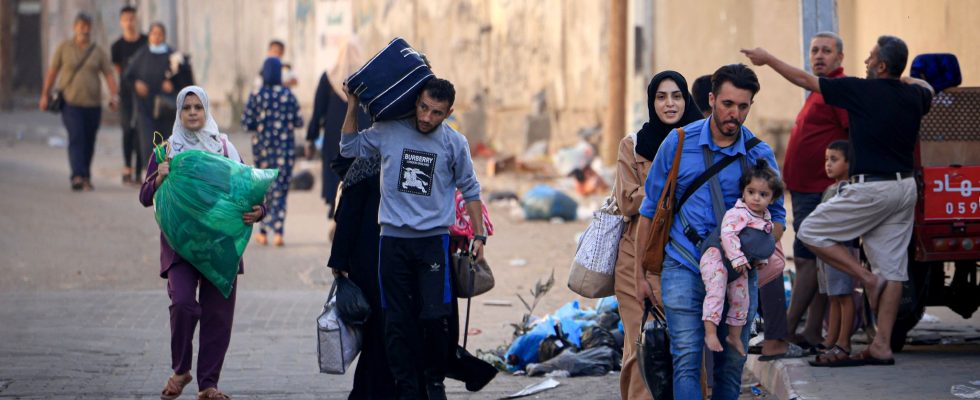As the war between Israel and Hamas gradually turns into a humanitarian drama, all eyes are on the Rafah border crossing, in the south of the Gaza Strip. Located along the border with Egypt, it is the only checkpoint not supervised by the Israeli army. It constitutes the only possible exit for the Palestinians in the Gaza Strip, who have been living in hell behind closed doors for a week. But also the only entry point for the humanitarian convoys currently heading towards Egypt.
The border crossing has remained closed since Tuesday, October 10, while international humanitarian law formally prohibits the state of “total siege”, as is the case for the 2.4 million Palestinians living in this enclave. According to the Egyptian authorities, the checkpoint was bombed several times on Monday October 9 and Tuesday October 10, during air retaliation launched by the Israeli army on the Gaza Strip. “Get out of here now,” Israeli Prime Minister Benjamin Netanyahu warned on Saturday October 7, the day Hamas launched a bloody and large-scale attack by bombing and military commando along the Israeli border, causing more than 1 200 dead and 150 hostages. The Israeli leader has since repeatedly promised to annihilate the terrorist organization Hamas and launched more than 6,000 rockets towards Gaza, causing the deaths of more than 1,500 people, including many civilians.
Rafah, strategic lever
The role of this border post is nevertheless crucial for humanitarian aid: it is the only way to establish a corridor with Gaza, allowing Palestinians with a visa or seriously injured to leave the territory by transiting through the Sinai, and for humanitarian convoys to bring in essential resources such as water, food and fuel, intended in particular to power the electricity generators of hospitals. Which also makes it a strategic lever for Israel. Israeli Energy Minister Israel Katz said his country would not allow basic necessities or humanitarian aid into Gaza until Hamas frees those kidnapped in Israel on Saturday – which are around 150, according to the army.
Without the entry of humanitarian convoys, Gaza’s only power plant is now out of operation due to lack of fuel. Friday October 13, the United Nations agency for Palestinian refugees (OCHA) also claimed that a desalination plant and a water reserve had been hit by airstrikes, forcing part of the population to drink water. sea water. Egypt nevertheless received yesterday a first shipment of food intended for Gaza, from Jordan. Al-Arich airport, capital of North Sinai 50 kilometers west of the Rafah border post, “has been chosen to receive international humanitarian aid”, the Egyptian Ministry of Affairs said on Thursday foreign. However, no convoy is approaching, according to local AFP sources.
Cairo promises help but no exit
Cairo, historic mediator in the Israeli-Palestinian conflict and supervisor of the Rafah crossings, is currently opposed to the idea of letting Palestinians fleeing the war enter its territory. The Egyptian president has repeatedly expressed his concern about the risk of an influx of refugees, while Israel announced Thursday the movement of a million Gazans towards the south of the enclave where the border post is located.
“Egypt’s national security is my first responsibility, and I will not neglect it under any circumstances,” President al-Sissi said, asserting that the residents of the Gaza Strip must “stay on their land.” While he stressed that Egypt was already welcoming “nine million guests, as I call them, coming from many countries in search of security and protection”, he also affirmed that the case of the inhabitants of Gaza was “different “, because their removal would mean “the elimination of the Palestinian cause”. According to some international experts, Egyptian leaders fear that Sinai will be given as land to the Palestinians if Gaza is completely destroyed.
According to the website of Mada Masrseveral scenarios are however explored by the Egyptian authorities, point The world. A reception plan, providing for the accommodation of refugees in tents or in public buildings, is in particular under discussion. This can however only be activated at the initiative of the Egyptian president, and under the supervision of the army.
